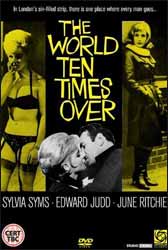|
Click here to return to the main site. DVD Review
Billa and Ginnie work and live in London’s vice-ridden club land, working as hostesses at the Pussycat Alley. Their jobs bring extra complications to their personal life. Billa’s dreads her father’s visit with his school master mentality and morals although she is ambivalent as to how much she needs his approval. Ginnie is also p0ondering the same question of acceptance with her rich boyfriend, who appears to be happy to turn his back on his family, but is she happy to turn her back on her life and friends? The World Ten Times Over (B&W. 1963. 1 hr, 29 min, 30 sec) is a slice of old style melodrama which just doesn’t get made today. The film was written and directed by Wolf Rilla (Village of the Damned (1960)) and the two films are stylistically similar. The plot details a single night when the two girls are forced, by circumstances, to confront the life they have chosen. Billa (Sylvia Syms) gets a visit from her father (William Hartnell - in his last role before he became the first doctor in Doctor Who), who is a stern and moralistic man who has little idea what his daughter does for a job. Even with all the clues around him he blocks out any knowledge, Syms performance implies that this offhand attitude towards her as a person was a long standing part of their relationship. Her frustration to his attitude of benign neglect finally erupts when she literally rubs his nose in the face that she is a ‘hostess’. Instead of the understanding she requires, her father reacts in his customary way and rejects her totally. Ginnie (June Ritchie) seems to have a simpler dilemma when her rich boyfriend, Bob Shelbourne (Edward Judd), offers to turn his back on his inheritance and wife in order to marry her. Like Billa, Ginnie discovers that her suitor does not want her for herself but what he imagines he wants her to be. In the end the two women discover that all they ever really had was each other, as they saw through the painted faces and gaudy costumes to accept each other as the totality of their personalities. The cast play their parts with real conviction; Sylvia Syms positively revels in her role of the tart with the broken heart, giving a convincing and powerful performance. June Richie does well but realistically has the weaker role, her decision to turn her back on her only one escape route out of prostitution didn’t ring as true as Billa’s story. William Hartnell, as the uptight and blinkered father, is a good study in self delusion. Things finally come to a head when both the father and Bob visit the club and are confronted by the reality of what the girls do for a living. It’s worth concentrating early on in the club scene as a very young Donald Sutherland appears briefly as an unnamed client. Rilla directs the film with a steady hand and though the film has obviously dated it also holds interest as a historical document of a London that has almost completely disappeared. The disc only has the original theatrical trailer (2 min, 33 sec) as an extra. The crisp black and white picture is presented in an aspect ratio of 1.66:1 with a mono 2.0 audio track. 7 Charles Packer |
|---|

